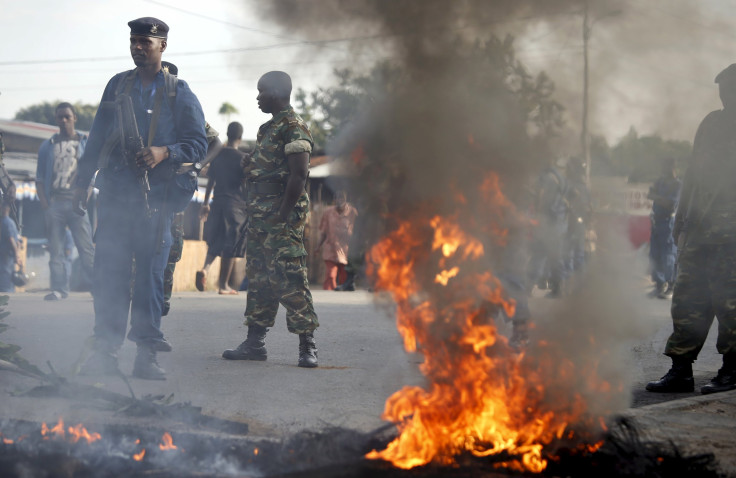Burundi Elections 2015: Military Coup To Form Amid Protests Over President Nkurunziza's Re-Election Bid

Burundi military officials took steps Wednesday to form a coup amid deadly and violent protests over President Pierre Nkurunziza bid for re-election. Senior officers were “dismissing” the president and a national salvation committee was set up to run the country, a Burundi army general told BBC News.
Burundi: A coup is being annonced in medias in Bujumbura, now. Nkurunziza no longer president of Burundi
— Désiré Nimubona (@desirenim) May 13, 2015Burundi: People celebrating the coup in streets, vuvuzela, cars' horns, noses, etc
— Désiré Nimubona (@desirenim) May 13, 2015Nkurunziza, who took office in 2005, was out of the country Wednesday at a summit in Tanzania with African leaders discussing his decision to run for a third term, which has triggered political and social unrest in Burundi’s capital city of Bujumbura in recent weeks. Meanwhile, police battled with demonstrators Wednesday, firing shots in the air and dispersing tear gas, Agence France-Presse reported.
Critics argue Nkurunziza’s third term bid is illegal because both the Burundian constitution and a peace deal which ended 12 years of civil war state that no president may be elected for more than two terms in office. The African Union, European Union and the United States have condemned Nkurunziza’s move to stay in power.
Burundi’s ruling party, the National Council for the Defense of Democracy-Forces for the Defense of Democracy (CNDD-FDD), said the president’s first term does not count because the former Hutu rebel leader was appointed by Parliament rather than elected. The CNDD-FDD confirmed April 25 that it had nominated Nkurunziza as a candidate for the presidential election scheduled to take place June 26.
“This is the argument with which they are trying to find their way around the Arusha agreement. If you read the document, it clearly states that no president should govern for more than two terms,” Domitien Ndayizeye, a former leader of Burundi, told Deutsche Welle last week. “There is no reason to destabilize the country. Even if he believes that he only had one term in office, I don’t understand why he wants to continue down this road if people are protesting.”
The government has blocked social media networks, independent radio stations and Burundian phone lines in an effort to stifle demonstrations. Police have fired tear gas, stun grenades and live ammunition on protesters in Bujumbura. More than 20 people have died and dozens others have been wounded from the violence since late April. Over 50,000 Burundians have fled into neighboring countries and more are expected to flee, AFP said.
© Copyright IBTimes 2025. All rights reserved.





















